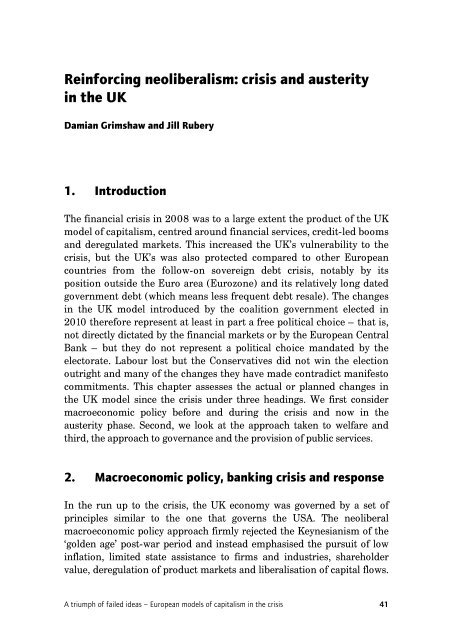- Page 1 and 2: A triumph of failed ideasEuropean m
- Page 4 and 5: A triumph of failed ideasEuropean m
- Page 6: Table of contentsSteffen LehndorffI
- Page 9 and 10: Steffen Lehndorff..................
- Page 11 and 12: Steffen Lehndorff..................
- Page 13 and 14: Steffen Lehndorff..................
- Page 15 and 16: Steffen Lehndorff..................
- Page 17 and 18: Steffen Lehndorff..................
- Page 19 and 20: Steffen Lehndorff..................
- Page 21 and 22: Steffen Lehndorff..................
- Page 23 and 24: Steffen Lehndorff..................
- Page 25 and 26: Steffen Lehndorff..................
- Page 27 and 28: Steffen Lehndorff..................
- Page 29 and 30: Dominique Anxo.....................
- Page 31 and 32: Dominique Anxo.....................
- Page 33 and 34: Dominique Anxo.....................
- Page 35 and 36: Dominique Anxo.....................
- Page 37 and 38: Dominique Anxo.....................
- Page 39 and 40: Dominique Anxo.....................
- Page 41: Dominique Anxo.....................
- Page 45 and 46: Damian Grimshaw and Jill Rubery....
- Page 47 and 48: Damian Grimshaw and Jill Rubery....
- Page 49 and 50: Damian Grimshaw and Jill Rubery....
- Page 51 and 52: Damian Grimshaw and Jill Rubery....
- Page 53 and 54: Damian Grimshaw and Jill Rubery....
- Page 55 and 56: Damian Grimshaw and Jill Rubery....
- Page 57 and 58: Damian Grimshaw and Jill Rubery....
- Page 60 and 61: After the party’s over:the Irish
- Page 62 and 63: After the party’s over: the Irish
- Page 64 and 65: After the party’s over: the Irish
- Page 66 and 67: After the party’s over: the Irish
- Page 68 and 69: After the party’s over: the Irish
- Page 70 and 71: After the party’s over: the Irish
- Page 72 and 73: After the party’s over: the Irish
- Page 74 and 75: After the party’s over: the Irish
- Page 76 and 77: After the party’s over: the Irish
- Page 78: After the party’s over: the Irish
- Page 81 and 82: Steffen Lehndorff..................
- Page 83 and 84: Steffen Lehndorff..................
- Page 85 and 86: Steffen Lehndorff..................
- Page 87 and 88: Steffen Lehndorff..................
- Page 89 and 90: Steffen Lehndorff..................
- Page 91 and 92: Steffen Lehndorff..................
- Page 93 and 94:
Steffen Lehndorff..................
- Page 95 and 96:
Steffen Lehndorff..................
- Page 97 and 98:
Steffen Lehndorff..................
- Page 99 and 100:
Steffen Lehndorff..................
- Page 101 and 102:
Steffen Lehndorff..................
- Page 103 and 104:
Steffen Lehndorff..................
- Page 105 and 106:
Florence Jany-Catrice and Michel La
- Page 107 and 108:
Florence Jany-Catrice and Michel La
- Page 109 and 110:
Florence Jany-Catrice and Michel La
- Page 111 and 112:
Florence Jany-Catrice and Michel La
- Page 113 and 114:
Florence Jany-Catrice and Michel La
- Page 115 and 116:
Florence Jany-Catrice and Michel La
- Page 117 and 118:
Florence Jany-Catrice and Michel La
- Page 119 and 120:
Florence Jany-Catrice and Michel La
- Page 122 and 123:
The Austrian model and the financia
- Page 124 and 125:
The Austrian model and the financia
- Page 126 and 127:
The Austrian model and the financia
- Page 128 and 129:
The Austrian model and the financia
- Page 130 and 131:
The Austrian model and the financia
- Page 132 and 133:
The Austrian model and the financia
- Page 134 and 135:
The Austrian model and the financia
- Page 136 and 137:
The Austrian model and the financia
- Page 138 and 139:
Hungary’s full-blown malaiseAndr
- Page 140 and 141:
Hungary’s full-blown malaise.....
- Page 142 and 143:
Hungary’s full-blown malaise.....
- Page 144 and 145:
Hungary’s full-blown malaise.....
- Page 146 and 147:
Hungary’s full-blown malaise.....
- Page 148 and 149:
Hungary’s full-blown malaise.....
- Page 150 and 151:
Hungary’s full-blown malaise.....
- Page 152 and 153:
Hungary’s full-blown malaise.....
- Page 154:
Hungary’s full-blown malaise.....
- Page 157 and 158:
Maria Karamessini..................
- Page 159 and 160:
Maria Karamessini..................
- Page 161 and 162:
Maria Karamessini..................
- Page 163 and 164:
Maria Karamessini..................
- Page 165 and 166:
Maria Karamessini..................
- Page 167 and 168:
Maria Karamessini..................
- Page 169 and 170:
Maria Karamessini..................
- Page 171 and 172:
Maria Karamessini..................
- Page 173 and 174:
Maria Karamessini..................
- Page 175 and 176:
Maria Karamessini..................
- Page 177 and 178:
Maria Karamessini..................
- Page 179 and 180:
Maria Karamessini..................
- Page 181 and 182:
Maria Karamessini..................
- Page 184 and 185:
Italy: Chronicle of a crisis foreto
- Page 186 and 187:
Italy: Chronicle of a crisis foreto
- Page 188 and 189:
Italy: Chronicle of a crisis foreto
- Page 190 and 191:
Italy: Chronicle of a crisis foreto
- Page 192 and 193:
Italy: Chronicle of a crisis foreto
- Page 194 and 195:
Italy: Chronicle of a crisis foreto
- Page 196 and 197:
Italy: Chronicle of a crisis foreto
- Page 198:
Italy: Chronicle of a crisis foreto
- Page 201 and 202:
Josep Banyuls and Albert Recio.....
- Page 203 and 204:
Josep Banyuls and Albert Recio.....
- Page 205 and 206:
Josep Banyuls and Albert Recio.....
- Page 207 and 208:
Josep Banyuls and Albert Recio.....
- Page 209 and 210:
Josep Banyuls and Albert Recio.....
- Page 211 and 212:
Josep Banyuls and Albert Recio.....
- Page 213 and 214:
Josep Banyuls and Albert Recio.....
- Page 215 and 216:
Josep Banyuls and Albert Recio.....
- Page 217 and 218:
Josep Banyuls and Albert Recio.....
- Page 220 and 221:
Crisis corporatism and trade union
- Page 222 and 223:
Crisis corporatism and trade union
- Page 224 and 225:
Crisis corporatism and trade union
- Page 226 and 227:
Crisis corporatism and trade union
- Page 228 and 229:
Crisis corporatism and trade union
- Page 230 and 231:
Crisis corporatism and trade union
- Page 232 and 233:
Crisis corporatism and trade union
- Page 234 and 235:
Crisis corporatism and trade union
- Page 236 and 237:
Crisis corporatism and trade union
- Page 238 and 239:
Crisis corporatism and trade union
- Page 240 and 241:
Crisis corporatism and trade union
- Page 242:
Crisis corporatism and trade union
- Page 245 and 246:
Janine Leschke, Sotiria Theodoropou
- Page 247 and 248:
Janine Leschke, Sotiria Theodoropou
- Page 249 and 250:
Janine Leschke, Sotiria Theodoropou
- Page 251 and 252:
Janine Leschke, Sotiria Theodoropou
- Page 253 and 254:
Janine Leschke, Sotiria Theodoropou
- Page 255 and 256:
Janine Leschke, Sotiria Theodoropou
- Page 257 and 258:
Janine Leschke, Sotiria Theodoropou
- Page 259 and 260:
Janine Leschke, Sotiria Theodoropou
- Page 261 and 262:
Janine Leschke, Sotiria Theodoropou
- Page 263 and 264:
Janine Leschke, Sotiria Theodoropou
- Page 265 and 266:
Janine Leschke, Sotiria Theodoropou
- Page 267 and 268:
Janine Leschke, Sotiria Theodoropou
- Page 269 and 270:
Janine Leschke, Sotiria Theodoropou
- Page 271 and 272:
Janine Leschke, Sotiria Theodoropou
- Page 273 and 274:
Janine Leschke, Sotiria Theodoropou
- Page 275 and 276:
Janine Leschke, Sotiria Theodoropou
- Page 277 and 278:
Janine Leschke, Sotiria Theodoropou
- Page 279 and 280:
Janine Leschke, Sotiria Theodoropou
- Page 281 and 282:
Janine Leschke, Sotiria Theodoropou
- Page 284 and 285:
List of contributors...............
- Page 286:
EuropeanTrade Union InstituteBd du








